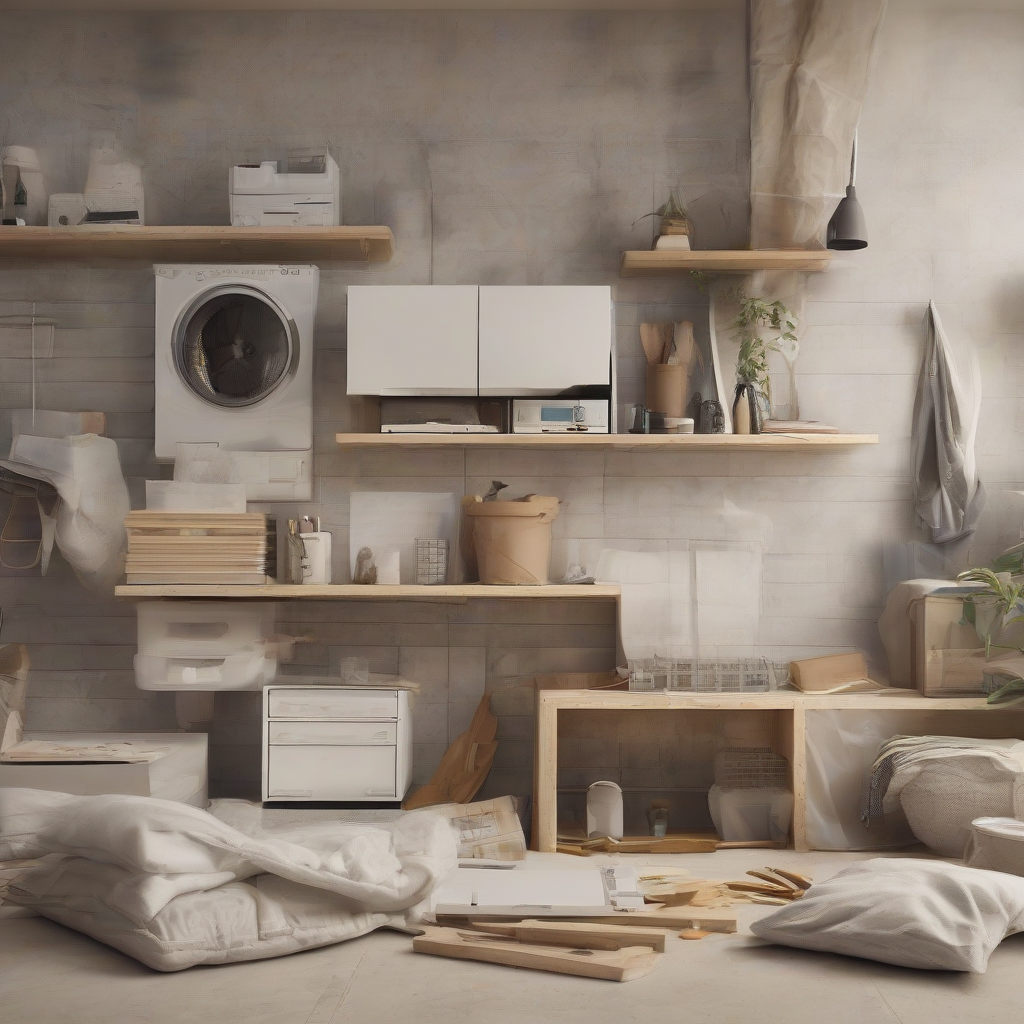Home Improvement HVAC: A Comprehensive Guide to Heating, Ventilation, and Air Conditioning Systems
Improving your home’s HVAC system is a significant home improvement project offering substantial returns on investment in comfort, energy efficiency, and home value. This guide delves into the multifaceted world of HVAC, covering various aspects crucial for homeowners considering upgrades or replacements.
Understanding HVAC Systems
HVAC (Heating, Ventilation, and Air Conditioning) systems encompass the technologies responsible for maintaining a comfortable indoor environment. They control temperature, humidity, and air quality, impacting both health and energy consumption.
Key Components of an HVAC System
- Furnace/Boiler: Provides heating, using either gas, oil, or electricity. Boilers heat water, while furnaces heat air directly.
- Air Conditioner: Cools the air using refrigerants to absorb heat from the indoor space.
- Air Handler/Blower: Circulates air throughout the home, distributing heated or cooled air via ductwork.
- Ductwork: The network of pipes or ducts that carry conditioned air from the HVAC unit to different rooms.
- Thermostat: Controls the operation of the HVAC system based on user-set temperature preferences.
- Ventilation System: Introduces fresh outdoor air and removes stale indoor air, improving air quality and reducing humidity.
Types of HVAC Systems
Several HVAC system types cater to different needs and home sizes. Choosing the right system requires careful consideration of factors such as home size, climate, energy efficiency, and budget.
1. Central HVAC Systems
These are the most common type, involving a single unit handling heating and cooling for the entire house through a network of ductwork.
- Advantages: Even temperature throughout the house, convenient control, relatively efficient for larger homes.
- Disadvantages: Can be expensive to install, requires significant space for equipment and ductwork, potential for duct leaks affecting efficiency.
2. Ductless Mini-Split Systems
These systems use individual indoor units connected to an outdoor compressor. Ideal for additions or homes without existing ductwork.
- Advantages: Cost-effective for smaller spaces or additions, zone control allowing different temperatures in different rooms, energy efficient.
- Disadvantages: Can be more expensive per unit than central systems, may not be aesthetically pleasing to some.
3. Geothermal Heat Pumps
These systems utilize the stable temperature of the earth to heat and cool a home. Highly efficient but require significant upfront investment.
- Advantages: Extremely energy efficient, significantly reduced operating costs, environmentally friendly.
- Disadvantages: High initial installation cost, requires land for ground loop installation.
4. Heat Pumps
Heat pumps can both heat and cool a home, using electricity to move heat rather than generating it directly. More efficient than traditional heating systems in milder climates.
- Advantages: Energy-efficient, environmentally friendly, reduces reliance on fossil fuels.
- Disadvantages: Can be less efficient in extremely cold climates, may require supplemental heating in severe winter conditions.
Home Improvement Projects Related to HVAC
Several home improvement projects directly impact HVAC system performance and efficiency. These can range from minor maintenance to major system upgrades.
1. HVAC System Maintenance and Cleaning
Regular maintenance is crucial for optimal performance and longevity. This includes:
- Air filter replacement: Changing filters regularly prevents dust buildup and improves air quality and efficiency.
- Coil cleaning: Cleaning evaporator and condenser coils removes debris, improving heat transfer and efficiency.
- Duct cleaning: Removes dust, allergens, and debris from ductwork, enhancing air quality and system efficiency.
- Annual inspections: Professional inspections identify potential issues early, preventing costly repairs.
2. Thermostat Upgrades
Smart thermostats offer programmable scheduling, remote control, and energy-saving features.
- Advantages: Enhanced energy efficiency, convenience, remote control capabilities.
- Disadvantages: Higher initial cost than basic thermostats.
3. Ductwork Repair and Sealing
Leaky ductwork significantly reduces HVAC system efficiency. Sealing leaks improves airflow and reduces energy waste.
- Advantages: Improved energy efficiency, lower energy bills, enhanced comfort.
- Disadvantages: Can be labor-intensive, requires professional assessment and repair in many cases.
4. HVAC System Upgrades and Replacements
Upgrading to a more efficient system significantly improves energy efficiency and comfort. Factors to consider include:
- SEER rating (Air Conditioning): A higher SEER rating indicates greater energy efficiency.
- AFUE rating (Furnace): A higher AFUE rating indicates greater energy efficiency for furnaces.
- System size: The system must be correctly sized for the home to ensure optimal performance.
- Technology: Consider advanced features such as variable-speed motors, smart technology integration.
5. Ventilation Improvements
Improving ventilation enhances indoor air quality and reduces humidity. Options include:
- Exhaust fans: Remove moisture and pollutants from bathrooms and kitchens.
- Whole-house ventilation systems: Provide continuous fresh air exchange throughout the home.
- HRV/ERV systems: Heat recovery ventilators (HRV) and energy recovery ventilators (ERV) recover heat or energy from exhaust air to preheat or precool incoming fresh air.
Choosing the Right HVAC Contractor
Selecting a qualified and reputable HVAC contractor is paramount for successful home improvement projects.
- Check licenses and certifications: Ensure the contractor is properly licensed and insured.
- Get multiple quotes: Compare pricing and services from several contractors.
- Read reviews and testimonials: Assess the contractor’s reputation and customer satisfaction.
- Ask about warranties and guarantees: Ensure the work is covered by warranties.
- Clarify the contract details: Thoroughly review the contract before signing.
Return on Investment (ROI) of HVAC Improvements
Investing in HVAC improvements often yields significant returns. Improved energy efficiency translates to lower energy bills, while a modern, efficient system enhances home value.
- Energy savings: Reduced energy consumption leads to direct cost savings.
- Increased comfort: A well-maintained and efficient system provides superior comfort.
- Improved home value: Modern HVAC systems are a desirable feature for potential homebuyers.
Conclusion
